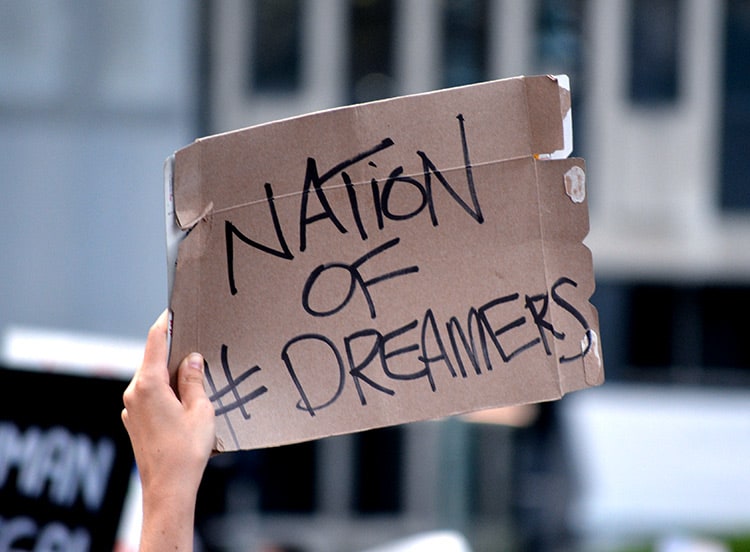
To hear him speak, you’d assume Donald J. Trump is the greatest dealmaker of all dealmakers. For all I know, maybe he is. People more familiar with deal-making than I will have to determine. He certainly appears successful in business, and he did write a book called The Art of the Deal. And last year, during his campaign, the now-president’s ability to get things done surely fed his appeal.
Curiously, though, people don’t seem pleased with his first high-profile political deal. Last week, you already know, the Republican dealmaker-in-chief made a deal with Democrats about DACA.
Illegal immigration sits right at the top of the president’s priorities, right up there with border security. This deal, struck with Democratic leadership, appears to ensure DACA—Deferred Action for Childhood Arrivals, a Democrat-led, Obama-era policy—makes it into law provided the bill includes Trump-approved border regulations. Basically, if Trump can accomplish a policy move important to him, he’ll pair it
with something important to leaders from across the aisle.
Ardent Trump supporters aren’t happy, left-wingers aren’t happy and the general population doesn’t appear to like it either.
You don’t have to scroll feeds long before you’ll see the word “compromise” popping up. Now, remove for a moment the subject and details of this particular deal and think about it: Isn’t deal-making, particularly among opposite-party politicians, politics at its best? Are we saying deal-making only appeals when it benefits one party and one party only?
Partisan Morals
Similarly, but more seriously, last week an op-ed appeared in The New York Times about evangelical support for president Trump. The piece makes some broad (and I think, poor) assumptions (If you’ve been within earshot of me for the past year, you’ve heard me disagree with the sweeping demographical definition of “evangelical” that gets thrown around.), but in the process the writer presents some troubling data: When Barack Obama was president, 30 percent of white evangelicals said they would forgive “a president’s immoral behavior.” Under the new president, the number grew to 72 percent.
When Obama was in office, only 30% of white evangelicals would forgive a president's immoral behavior. Now it's 72%. https://t.co/c6FlHbziMi pic.twitter.com/VTNov7TJRk
— Keith Boykin (@keithboykin) September 14, 2017
Race undoubtedly factors prominently here, which stands as a tragic indictment of that group. But I’m willing to bet party affiliation plays the biggest role in this moral flip-flop. Case in point, take Ben Carson’s suggestion that sometimes people of faith need to put their “Christian values on pause to get the work done.” The white evangelicals surveyed seemingly took his advice.
The survey points to simple, hard-line partisanship on the part of Christians. When someone who agrees with us fails, we’re happy to extend grace. When someone from the Other Side does, forget about it.
I think we can take these two instances as examples of the same phenomenon: Whether policy deals or immorality, partisanship increasingly defines the way we Americans—and often we Christians—see each other.
The Dangers of Partisanship
Many of these issues aren’t simple. Yes, illegal immigration is illegal, and the breaking of laws carries consequences. The DACA debate brings with it important and complex issues. Likewise, discussions of how the morality of a politician relates to his or her ability to legislate often stall with a lot of illogical assertions driven more by emotion than anything else. These discussions, too, bring with them important and complex issues surrounding the morality of a president. And the DACA debate presses in the immediate, while morality remains pertinent. But these instances raise deeper questions.
For society at large, we face a danger: Have party lines and political outrage become more important to us than the actual work of politics?
I don’t want to defend the DACA deal necessarily. Those who disagree for policy reasons and have concerns about processes and precedents, fine. That’s the benefit of living in a country “ruled” by the citizenry. But if you find yourself chafing at the deal just because you’d rather see Nancy Pelosi and Chuck Schumer lose than win, you have a problem. And if you find yourself angry just because your party leadership works with a Republican president, you have a problem.
And for Christians, the stakes are even higher.
Every Christian I’ve ever met agrees that children are uniquely important in the Christian vision of society, and that morality and character matter (and so does grace). And because of that, we’re need to ask the question, Have we allowed partisanship to overshadow virtues all Christians in all societies would (or should) be about?
If true that American evangelicals are more likely to overlook immorality in someone who agrees with them on, say, federal tax policy, we have a problem. And if we’re less likely to extend grace to someone because they disagree with us about the size of the government, we have a problem.
Taxes and tax codes matter, for sure. Scope of the government is also important. And in today’s world, politics often involves critical moral questions about the nature of family and rights of the unborn. We can’t reduce those issues to mere matters of opinion.
But neither can someone’s political party affiliation affect the responsibility of Christians around him or her—the responsibility to be clear about what sin is and clear about the Savior who erases it.






















